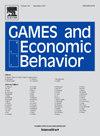Endogenous limits on veto power in dynamic bargaining
IF 1
3区 经济学
Q3 ECONOMICS
引用次数: 0
Abstract
We consider an infinitely repeated legislative bargaining model with a dynamically evolving status quo. Three players, one of whom is permanently endowed with veto power, must split a fixed budget in each period. Despite her additional power, the veto player cannot always asymptotically extract the full surplus. The non-veto players endogenously prevent each other's expropriation when they are patient and have high initial allocations in the unique stationary, symmetric, stage-undominated, coalition-proof Markov perfect equilibrium. Further, we show that veto power and higher recognition probability may be strategic substitutes rather than complements. We also provide an intuition behind selfish egalitarianism between non-veto players. Our technique of employing coalition-proofness and iteratively generating a new equilibrium with novel predictions sheds light on the divergence in recent literature on the value of veto power and may be useful in other environments.
动态议价中否决权的内生限制
我们考虑一个无限重复的立法议价模型与动态发展的现状。三个玩家,其中一个拥有永久否决权,必须在每个时期分配固定的预算。尽管拥有额外的权力,否决权的参与者并不总是渐进地提取全部盈余。在唯一的平稳、对称、阶段非支配、防联盟的马尔可夫完美均衡中,当无否决权参与者耐心且初始分配较高时,他们会内生地阻止对方的征用。此外,我们表明否决权和更高的承认概率可能是战略替代而不是互补。我们还提供了一种无否决权国家之间自私平均主义背后的直觉。我们采用防联盟性和以新颖的预测反复产生新的平衡的技术阐明了最近文献中关于否决权价值的分歧,并可能在其他环境中有用。
本文章由计算机程序翻译,如有差异,请以英文原文为准。
求助全文
约1分钟内获得全文
求助全文
来源期刊

Games and Economic Behavior
ECONOMICS-
CiteScore
1.90
自引率
9.10%
发文量
148
期刊介绍:
Games and Economic Behavior facilitates cross-fertilization between theories and applications of game theoretic reasoning. It consistently attracts the best quality and most creative papers in interdisciplinary studies within the social, biological, and mathematical sciences. Most readers recognize it as the leading journal in game theory. Research Areas Include: • Game theory • Economics • Political science • Biology • Computer science • Mathematics • Psychology
 求助内容:
求助内容: 应助结果提醒方式:
应助结果提醒方式:


